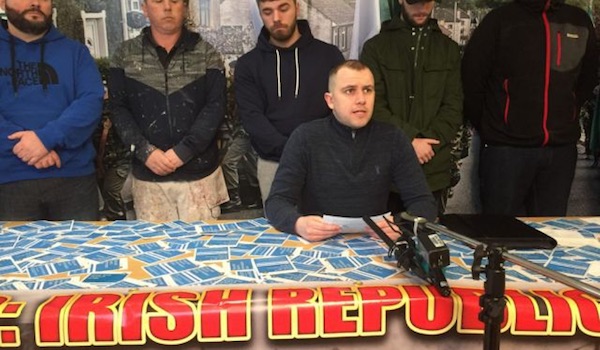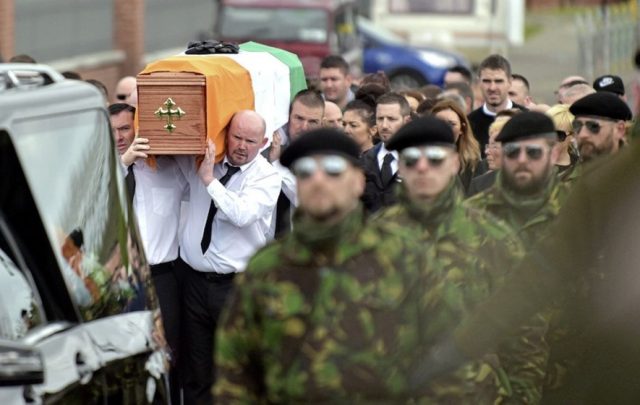
Derry Saoradh chairman Joe Barr (front centre) remanded in custody on IRA terrorist offences
Derry man Joe Barr claimed the case was undermined because no outlawed grouping had been specified in the charge against him.
But the Court of Appeal on Wednesday ruled that his prosecution did not require precision about paramilitary factions.
Lord Justice Treacy said: “It would be wrong to require a degree of specificity in the charges which would prevent the legislation from achieving its purpose.”
Joe Barr, 32, challenged his conviction for wearing clothing in a way to arouse suspicions that he was a member or supporter of a proscribed organisation.
He was among 12 men said to have been observed by police marching in a military formation at the funeral of Michael Barr in Strabane, Co Tyrone in May 2016.
The deceased, a 34-year-old from the Tyrone area, had been shot dead in a Dublin pub.
His killing has been linked to a bitter feud between warring Irish gangland bosses.
Hundreds of mourners attended the murder victim’s funeral Mass, with a dozen individuals dressed in paramilitary-style uniform seen flanking the cortege on its way to the church.
Fifteen men were arrested following the service and questioned about alleged membership of a dissident republican grouping known as the New IRA.

The paramilitary funeral of Michael Barr in Strabane in 2016
A judge imposed a £375 fine for the offence under the Terrorism Act 2000.
The case was referred to the Court of Appeal to examine the lawfulness of the conviction.
Barr’s legal team argued that the way the prosecution framed its charge was unprecedented and unlawful.
In other cases the proscribed organisation has always been named, his lawyers claimed.
By failing to select any proscribed organisation at all, they argued, Barr could not have known with any precision what he had been charged with.
The prosecution countered that the outlawed grouping did not have to be specified for the charge in question.
Senior judges were also told it was a “fallacy” to suggest Barr had any doubt which organisation he was being questioned about in police interviews.
Dismissing the appeal, Lord Justice Treacy held that the conviction complied with legal requirements and guidance in previous case law.
He added: “The legislation does not require the suspicion to be precise in relation to factions.
“If it were otherwise it would be extremely difficult to utilise the Act to prevent public displays of paramilitary power because the internal workings of these organisations cannot be known by observation alone.”
Barr is currently in custody after being charged with IRA membership offences after MI5 bugged two meetings of the New IRA leadership and secretly recorded what was said.
At the time of his arrest, Barr was the chairman Derry’s Saoradh branch, which is the political wing of the New IRA.
This week Saoradh members protested inside the Derry branch of Santander claiming the bank had frozen or shut down accounts of local republicans.
Tags:




